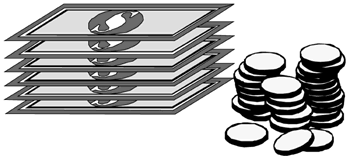Heavy Hitters
Who's Who on the Forbes 400
By Peter Werby
ACCORDING to a yearly study published by United for a Fair Economy, a Boston think tank, not only are the rich getting richer at the expense of the classes below them, but the pace is accelerating. For instance, Microsoft billionaire Bill Gates, the richest American, doubled his wealth last year to a net worth of almost $40 billion.
Some people find his rapid increase in riches so fascinating that there's even a website Wealth Clock devoted to him.
Each year UFE releases its survey "Born on Third Base: The Sources of Wealth of the Forbes 400" to coincide with the World Series and employs baseball language to assess the status of the very rich. Its data track the financial and biographical origins of the 400 richest individuals and families listed in the October issue of Forbes magazine. "Forbes celebrates what they call the bootstrappers, the Horatio Alger stories" says Charles Collins, co-director of UFE. "We thought it would be interesting to look at who inherited their way onto the list or had a wealthy head start."
He adds sarcastically that the key to great riches is choosing wealthy parents or grandparents. Two thirds of those on the Forbes list, according to Collins, began with substantial start-up capital, and nearly half inherited enough wealth (Born on Home Plate) to rank in the 400 at birth.
Being Born on First, Second, or Third Base, according to the study, means the individual began with considerable income or family assistance. Less than a third actually did the rags-to-riches route, and are considered by UFE to have Started in the Batter's Box. The current Forbes poll shows that entry to the coveted circle has become more costly. Last year you needed $415 million to make the list; that's increased this time to a net worth of $475 million.
Here are the rankings:
At the same time that the wages of average Americans continue to stagnate, the number of billionaires in the United States has jumped from 135 to 170 in just one year. The combined net worth of the wealthiest 400 individuals increased 30.5 percent from at least $478.1 billion in 1996 to at least $623.9 billion in 1997.
"Wealth creating wealth at the top is particularly troubling when we look at the widening gap between the rich and everyone else," says Collins. "While a growing number of Americans have stagnating incomes, declining savings, and limited retirement options, the inherited asset-holdings at the top are multiplying. There may be 26 percent more billionaires, but there are not 26 percent more homeowners or 26 percent fewer children growing up in poverty."
Census data confirm that trend. The top 5 percent of the population holds 60 percent of the nation's net worth, while the rest of us unequally split up the remainder.
The result of this increasing disparity is reported in another recent study, "Hunger in a Global Economy: Hunger 1998," released by the Washington, D.C.-based Bread for the World Institute, showing the United States with the highest wage inequality of any industrialized nation.
According to David Beckmann, president of the food advocacy group, 4 million U.S. households suffer from moderate to severe hunger. "We sat by quietly," says Beckmann, referring to last year's budget debate, "while federal efforts to reduce poverty and hunger were dramatically scaled back. The only thing that got cut were programs affecting poor people."
Bread for the World is urging Congress to pass the Hunger Has a Cure bill, which would fund nutrition programs that were previously cut or eliminated.
Collins' UFE also wants a change. "For the past 20 years," he says, "American workers have stepped up to the plate and hit sacrifice flies so our nation's rich can score. "It's time to correct the imbalance."
[ Sonoma County | MetroActive Central | Archives ]
Copyright © Metro Publishing Inc. Maintained by Boulevards New Media.
![]()

The UFE study is available from UFE, 37 Temple Place, Fifth Floor, Boston, MA 02111; 617/423-2148. The hunger report can be obtained from Bread for the World, 1100 Wayne Ave., Suite 1000, Silver Spring, MD 20910; 301/608-2400.
From the December 24-31, 1997 issue of the Sonoma County Independent.
![[MetroActive News&Issues]](/gifs/news468.gif)